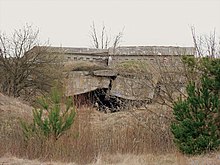
Back Асавецкая крэпасць Byelorussian Festung Osowiec German Οχυρό του Οσόβιετς Greek Fortaleza de Osowiec Spanish دژهای اوسوویتس Persian Complexe fortifié d'Osowiec French מצודת אוסובייץ HE Osowieci erőd Hungarian Fortezza di Osowiec Italian Osoveco tvirtovė Lithuanian
53°28′20″N 22°39′06″E / 53.47222°N 22.65167°E




Osowiec Fortress (Polish: Twierdza Osowiec; Russian: Крепость Осовец, romanized: Krepost' Osovets) is a 19th-century fortress built by the Russian Empire, located in what is now north-eastern Poland. It saw heavy fighting during World War I when it was defended for several months by its Russian garrison against German attacks.
The fortress was built in the years 1882–1892 as one of the defensive works to protect the western borders of Russia against Germany, and continuously modernised afterwards to cope with advances in heavy siege artillery. In 1889–1893, military engineer Nestor Buinitsky took an important part in the creation of the fortress. It was located on the river Biebrza about 50 km from the border with the German province of East Prussia, in the one place where the marshlands of the river could be crossed, hence controlling a vital chokepoint. The extensive marshlands and bogs that surrounded it made attacks upon it difficult. The strategic Belostok–Lyck–Königsberg rail line also ran through the fortress and crossed the Biebrza river there. The fortress saw heavy fighting during the beginning of World War I in the eastern front from September 1914 until the Russian Army abandoned it in August 1915. In the interwar years the fortress was used by the Polish Army. During the German invasion of Poland in 1939 it was bypassed and did not see much fighting.
Today, some parts of the fortress are accessible to tourists, especially the parts within the boundaries of Biebrza National Park. The visitor information center of the park is located in Osowiec-Twierdza,[1] a small settlement located within the boundaries of the fortress. Other parts of the fortress still belong to the Polish Army and access is restricted.